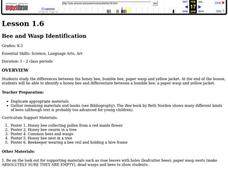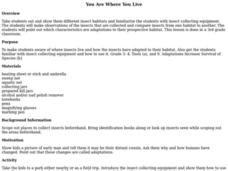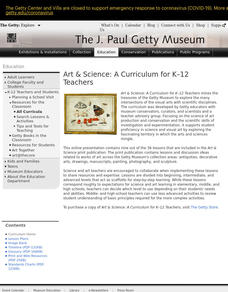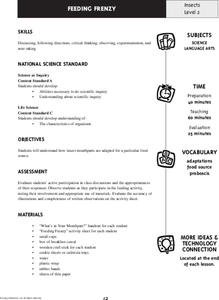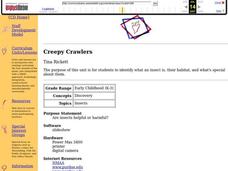Desert Discoveries
Amazing Arthropods
Arthropods are the stars of a fine science lesson. Learners look at the diversity, characteristics, adaptations, and important roles that these insects play in the Sonoran Desert environment. A terrific document called "Amazing...
Curated OER
Reading "Beetles, Bees and Butterflys"
Reading information about beetles, bees, and butterflies is the focus of this science worksheet. Students apply vocabulary and comprehension skills in order to answer six questions based on the reading.
Curated OER
Plan, Do, Review...What's Bugging You?
Students explore insects through literacy, In this literacy lesson, students discover the characteristics of ladybugs and gain information from the text, "The Grouchy Ladybug". Students go on a "bug hunt".
Curated OER
Bee and Wasp Identification
Students study the differences between honey bee, bumble bee, paper wasp, and yellow jackets. In this insect classification lesson, students study posters of various bees and wasps. Students read the story Holly Honey Bee Story. Students...
Curated OER
You Are Where You Live
Third graders observe insects in a number of habitats. They recognize which insect characteristics are adaptations to their habitats.
Curated OER
Parasite Development and Life Cycle
If you are new to teaching agriculture classes, this outline may be helpful when you are preparing a lecture on parasites in livestock. In addition to lecturing on this topic, the lesson plan suggests that learners research the life...
Curated OER
Catch as Catch Can
Young scholars investigate insects. For this insect analysis lesson, students catch insects using nets they make. They identify the insects they catch and create a chart to show the numbers and varieties. This lesson includes a...
Curated OER
Insects
Students, through books, videos, and readings, explore characteristics of insects. In groups, they choose an insect to research. Students discover their insect's diet, how they move, and where they live. Afterwards, they use the facts...
Curated OER
Animals Galore
A well-designed lesson plan which covers the characteristics of the animals found in the six animal groups is here for your young biologists. In it, learners divide up into six groups; the amphibians, reptiles, mammals, birds, fish, and...
Curated OER
Unidentified (Flying?) Arthropods
Beginning biologists learn the characteristics of the five classes in the arthropod phylum. A student handout lists characteristics to help them identify five specimens. You will need to collect an example of each: arachnida, crustacea,...
Curated OER
Tables
Can you read this table? Learners begin to comprehend data analysis through examining two simple tables and answering comprehension questions. The first gives characteristics about three animals in yes-or-no format (i.e. "eats insects,"...
Curated OER
Moth or Butterfly
Young scholars categorize butterflies and moths by identifying the unique characteristics of the two different species. In this classifying lesson, students discuss their prior knowledge about these insects before categorizing the...
Curated OER
Habitat Assessment
Third graders demonstrate the effects of varying environmental components on plants and animals: chemical, physical and biological characteristics of a habitat. They find chemical, physical and biological characteristics of the lake at...
ARKive
Marvellous Mini-beasts – Design a Species
Here is a creative activity that teaches kids how species evolve different characteristics for survival. The lesson begins as the class discusses and examines the adaptive traits of mini-beasts or insects. Then, in small groups, they...
Curated OER
Exploration of "Pillbugs"
Fifth graders define vocabulary terms, identify the characteristics of a pillbug, and create a dichotomous key. Then they examine the pillbugs and make observations and record these observations. Finally, 5th graders observe specific...
Michigan State University
Friend or Foe?
What one person thinks is a pest may not be a pest to someone else. Here, scholars examine the characteristics of living things and pests through grand conversation and a variety of activities. Class members play a game of pest or not a...
Curated OER
Termite Biology
Students explore the physical characteristics, distribution and habitat of termites. The lesson focuses on the termite as a social creature contrary to most other insects.
Curated OER
Here a Bug, There a Bug
Students explore insects and discover that insects found in different parts of the country have characteristics that can be observed and described.
Curated OER
Clearly Classified
Learners investigate plants and insects. In this science classification lesson, students create separate categories for insects and plants by characteristics. Learners discover scientific names of insects.
Curated OER
"What Insecit Am I"
Pupils play the game "What Insect Am I" to explore the parts of an insect and their habitats.
Curated OER
Are You One of Us?
Students investigate how scientists sort and classify organisms. In this sorting and classifying lesson, students examine what systematics are as tools that scientists use. They examine images of invertebrates and sort them while stating...
Curated OER
Identifying Organisms
In this organisms worksheet, 9th graders look at each picture of insects and use the key at the bottom of the sheet to determine which order they belong to. Then they explain which insect is a true bug and which is a true beetle and...
Curated OER
Feeding Frenzy
Students examine, through experimentation and simulation, how insect mouthparts are adapted for particular food sources, discuss how various animals have adapted to survive, play Feeding Frenzy game, and complete activity sheets.
Curated OER
Creepy Crawlers
Students identify the characteristics of an insect and their habitat. They read books about insects, research different types of insects, and create their own insect art. The project also includes the creation of an insect song and...





